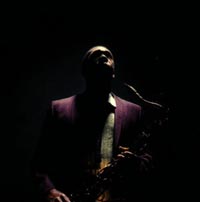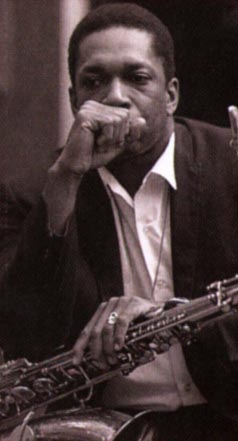
1926 - 1967

In the annals of jazz, only a handful
of musicians are recognized worldwide by their nicknames alone. There is Duke (Duke
Ellington), Pres (Lester Young), and Bird (Charlie Parker). Then there is Trane - John
Coltrane. Just as Parker's advanced playing set the jazz world on its ear in the late
1940s Coltrane's further progressions on the sax kept things hopping in the 1950s and
1960s.
Coltrane was born in Hamlet, North Carolina, on September 23, 1926. His
father was a tailor and amateur musician, who died when John was 12. While he was growing
up, John usually had his nose stuck in a book, but at night john was an avid listener of
jazz on the radio. He started to play the clarinet in elimentary school, but switched to
alto sax in high school. John continued studying music after graduation, when he and two
friends moved to Philadelphia. John was drafted into the Navy in 1945 and assigned to play
in dance and marching bands in Hawaii.
After the service John signed up for music school, but he soon joined a
touring band. He played with many of the great dance bands, including those led by Eddie
"Cleanhead" Vinson, Dizzy Gillespie, Earl Bostic, and Johnny Hodges. By the late
1940s, Coltrane had an obvious weight problem, he began drinking heavily, and like many
jazz men of his time, he became addicted to heroin.
Despit his addiction, 1955 was an important year for John. He married his
first wife, Naima, and began to make a national reputation for himself playing and
recording with trumpeter Miles Davis. Now living in New York, John began to record for the
Prestige and Blue Note record labels. In 1957 he quit heroin and alcohol cold turkey. That
same year he said he experienced a spiritual awakening and returned to the study of
Eastern religions, philosophies, and music that he had begun in the early 1950s.
One critic writing in 1958 described John's harmonically complex style as
"sheets of sound." But not everyone found the dense texture of his music
appealing. The critics remained evenly split on John Coltrane: Some people felt he was a
musical genius; others labeled his musi anti-jazz. Debates between critics aside, Coltrane
had a fanatical following. When one fan played back one of his solos on a 50-cent Kazoo,
Trane was so touched that he treated the man to dinner. For another fan who arrived at a
club just as Coltrane was walking off the bandstand, John returned to play him a 15-minute
unaccompanied version of "My Favorite Things". His home became a refuge for
young musicians, who idolized him both for his music and his quiet, generous manner. One
college jazz teacher compared the impact of Coltrane's music on other musicians with Bach
and Brahms.
Soon after forming the John Coltrane Quartet, John signed with Impulse
Records. His music remained controversial. When A Love Supreme was released Down Beat
magazine assigned two writers to review it. One critic awarded the LP five stars; the
other one only gave it one.
Divorced from Naima and married to Alice McLeod, a jazz pianist, John
Coltrane had three sons. John's fame spread worldwide. Landing at Tokyo's airport for a
tour of Japan in 1966, he was amazed to find a crowd of several thousand to greet him. His
music grew more adventurous each year, taking in Indian and African influences.
In 1967 John's health began to fail: he was stricken by headaches and stomach
problems. Rushed to a long Island hospital in excruciating pain, he died the next day,
july 11, 1967, from the effects of liver cancer. A memorial was held in New York a few
days later, it attracted hundreds of friends, family, and fans. John was 40 years old when
he died.
